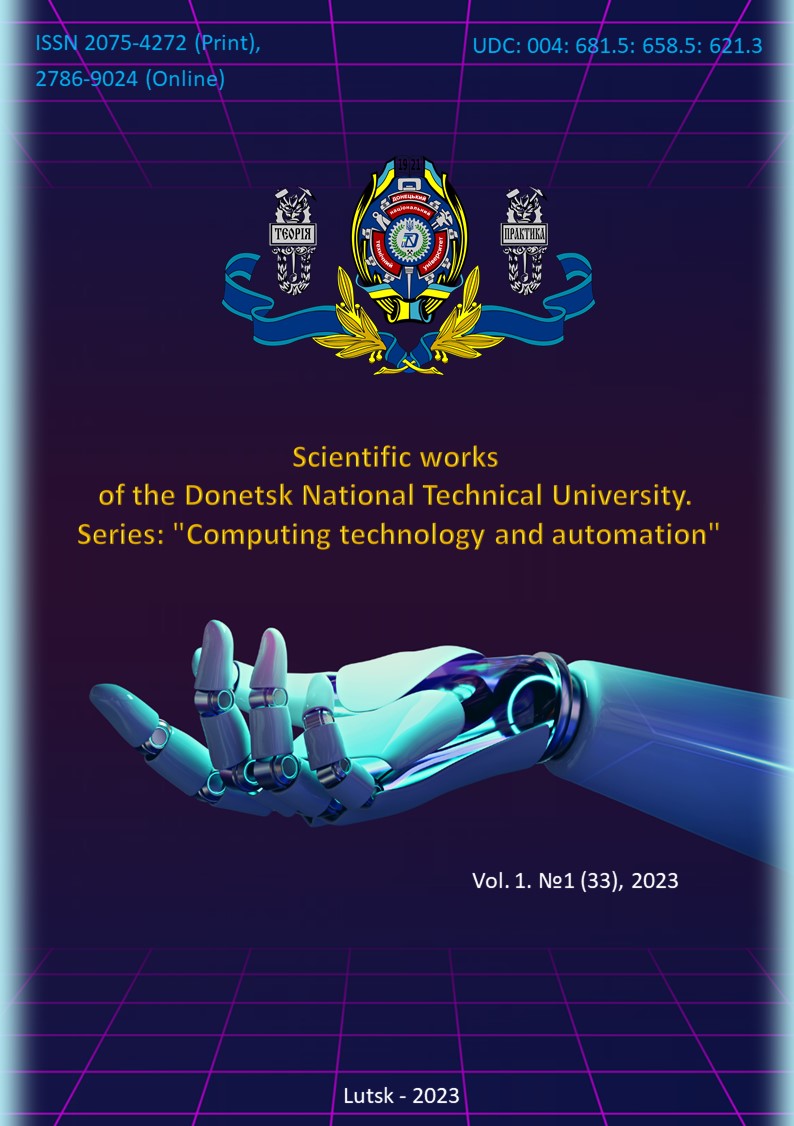REQUIREMENT PRIORITIZATION IN THE DEVELOPMENT OF SOFTWARE PROJECTS FOR CRITICAL INFRASTRUCTURE OBJECTS
DOI:
https://doi.org/10.31474/2786-9024/v1i1(33).296148Keywords:
requirement prioritization, WOA, GWO, critical infrastructure object, CIAbstract
The objective of the study is to develop an algorithm for prioritizing requirements in the development of software for critical infrastructure object projects. Requirement development is a fundamental phase in any software project, as this phase involves the identification, processing, and manipulation of requirements. The primary source of these requirements is project stakeholders, taking into account project constraints and limits. The number of requirements varies for each software project for a critical infrastructure object, hence the term requirement prioritization pertains to determining the priority order of executing software requirements based on considerations and decisions of stakeholders.
Various proposed optimization algorithms are employed to address optimization tasks. This paper presents the main stages of basic optimization algorithms, some of their modifications aimed at enhancing their efficiency in solving such types of problems. Additionally, a hybrid approach based on WOA and GWO optimization algorithms is proposed, combining the advantages of each algorithm to determine the priority of requirements for critical infrastructure object software. Furthermore, a dataset from the SKUDA project is provided, utilized in this research, meeting the requirements of a real software project for evaluating the proposed method.
The scientific novelty lies in the modification, application, and combination of results from well-known GWO and WOA algorithms to address the requirement prioritization task for critical infrastructure object software projects. The proposed algorithm achieves an accuracy of 92% for the proposed set of requirements.
References
M. S. Hasan, A.A. Mahmood, M.J.Alam, S.N.Hasan, & F.Rahman, “An evaluation of software requirement prioritization techniques”, International Journal of Computer Science and Information Security (IJCSIS), vol. 8, iss. 9, 2010.
C.Duan, P.Laurent, J.Cleland-Huang, & C.Kwiatkowski, “Towards automated requirements prioritization and triage”, Requirements engineering, vol. 14, iss. 2, 73-89, 2009, doi: 10.1007/s00766-009-0079-7.
R.Masadeh, A.Alzaqebah, & A.Sharieh, “Whale Optimization Algorithm For Solving The Maximum Flow Problem”, Journal of Theoretical & Applied Information Technology, vol. 96, iss. 8, 2018.
A.K.Jain, M.N.Murty, & P.J.Flynn, “Data clustering: a review”, ACM computing surveys (CSUR), vol. 31, iss. 3, 264-323, 2019, doi: 10.1145/331499.331504.
H.Emami, & F.Derakhshan, “Integrating fuzzy K-means, particle swarm optimization, and imperialist competitive algorithm for data clustering”, Arabian Journal for Science and Engineering, vol. 40, iss. 12, 3545-3554, 2015, doi: 10.1007/s13369-015-1826-3.
F.Yang, T.Sun, & C.Zhang, “An efficient hybrid data clustering method based on K-harmonic means and Particle Swarm Optimization”, Expert Systems with Applications, vol. 36, iss. 6, 9847-9852, 2009, doi: 10.1016/j.eswa.2009.02.003
J.Nayak, B.Naik, & H.S.Behera, “Fuzzy C-means (FCM) clustering algorithm: a decade review from 2000 to 2014”, Computational intelligence in data mining, vol. 2, 133-149,2015, doi: 10.1007/978-81-322-2208-8_14. Springer, New Delhi.
Y.Kumar, & G.Sahoo, “Hybridization of magnetic charge system search and particle swarm optimization for efficient data clustering using neighborhood search strategy”, Soft Computing, vol. 19, iss. 12, 3621-3645, 2015, doi: 10.1007/s00500-015-1719-0.
Q.H.Zhang, B.L.Li, Y.J.Liu, L.Gao, L.J.Liu, & X.L.Shi, “Data clustering using multivariant optimization algorithm”, International Journal of Machine Learning and Cybernetics, vol. 7, iss. 5, 773-782, 2016, doi: 10.1007/s13042-014-0294-5.
S.Mirjalili, & A.Lewis, “The whale optimization algorithm”, Advances in Engineering Software, vol. 95, 51-67, 2016, doi: 10.1016/j.advengsoft.2016.01.008.
A.Alzaqebah, R.Masadeh, & A.Hudaib, “Whale Optimization Algorithm for Requirements Prioritization”, the 9th International Conference on Information and Communication Systems (ICICS), 84-89, 2019, doi: 10.1109/IACS.2018.8355446.
S.Chander, P.Vijaya, & P.Dhyani, “Multi kernel and dynamic fractional lion optimization algorithm for data clustering”, Alexandria engineering journal, vol. 57, iss. 1, 267-276, 2018, doi: 10.1016/j.aej.2016.12.013.
E.Çomak, “A modified particle swarm optimization algorithm using Renyi entropy-based clustering”, Neural Computing and Applications, vol. 27, iss. 5, 1381-1390, 2016, doi: 10.1007/s00521-015-1941-9.
S.Mirjalili, S.M.Mirjalili, & A.Lewis, “Grey wolf optimizer”, Advances in engineering software, vol. 69, 46-61, 2014, doi: 10.1016/j.advengsoft.2013.12.007.
J.Karlsson, C.Wohlin, & B.Regnell, “An evaluation of methods for prioritizing software requirements”, Information and software technology, vol. 39, iss. 14-15, 939-947, 1998, doi: 10.1016/S0950-5849(97)00053-0.
D.Leffingwell, D.Widrig, “Managing Software Requirements: A Unified Approach”. Upper Saddle River:Addison- Wesley, 2009.
S.Hatton, “Early prioritisation of goals”, International Conference on Conceptual Modeling, 235-244, 2007, doi: 10.1007/978-3-540-76292-8_29. Springer, Berlin, Heidelberg.
B.Regnell, M.Höst, J.Natt och Dag, P.Beremark, T.Hjelm, “An industrial case study on distributed prioritization in market-driven requirements engineering for packaged software”, Requirements Engineering, vol. 6, iss. 1, 51-62, 2001, doi: 10.1007/s007660170015.
T.L.Saaty, “The analytic hierarchy process”. McGraw-Hill, New York, 1980.
L.Lehtola, & M.Kauppinen, “Empirical evaluation of two requirements prioritization methods in product development projects”, European Conference on Software Process Improvement, 161-170, doi: 10.1007/978-3-540-30181-3_15. Springer, Berlin, Heidelberg, 2004.
L.Lehtola, “Suitability of requirements prioritization methods for market-driven software product development”, Softw. Process Improve. Pract., vol. 11, 7-19, 2006, doi: 10.1002/spip.249.
Y.Shen, A.E.Hoerl, & W.Mcconnell, “An incomplete design in the analytic hierarchy process”, Mathematical and Computer Modelling: An International Journal, vol. 16, iss. 5, 121-129, 1992.
P.T.Harker, “Incomplete pairwise comparisons in the analytic hierarchy process” , Mathematical Modelling, vol. 9, iss. 11, 837-848, 1998, doi: 10.1016/0270-0255(87)90503-3.
J.Karlsson, S.Olsson, & K.Ryan, “Improved practical support for large-scale requirements prioritising”, Requirements Engineering, vol. 2, iss. 1, 51-60, 1997, doi: 10.1007/BF02802897.
D.Leffingwell & D.Widrig, “Managing Software Requirements: A Unified Approach”. Upper Saddle River:Addison- Wesley, 1999.
DSDM Project Framework. [Online]. URL: http://surl.li/rlcbf. Accessed: 09.11.2023.
A.V.Aho, J.E.Hopcroft, & J.Ullman, “Data structures and algorithms”. Addison-Wesley Longman Publishing Co., Inc., 1993.
S.Lauesen, “Software requirements – styles and techniques”. Pearson Education, Essex, 2002.
R.Masadeh, A.Alzaqebah & A.Hudaib, “Grey Wolf Algorithm for Requirements Prioritization”, Modern Applied Science, vol. 12, iss. 2, 54, 2018, doi: 10.5539/mas.v12n2p.
S.L.Lim, “Social networks and collaborative filtering for large-scale requirements elicitation”, doctoral dissertation, University of New South Wales, 2011. [Online]. URL: http://surl.li/rlcck. Accessed: 09.11.2023.
Downloads
Published
How to Cite
Issue
Section
License
Copyright (c) 2024 IAROSLAV DOROHYI, Olena Doroha-Ivaniuk

This work is licensed under a Creative Commons Attribution-NonCommercial-NoDerivatives 4.0 International License.





